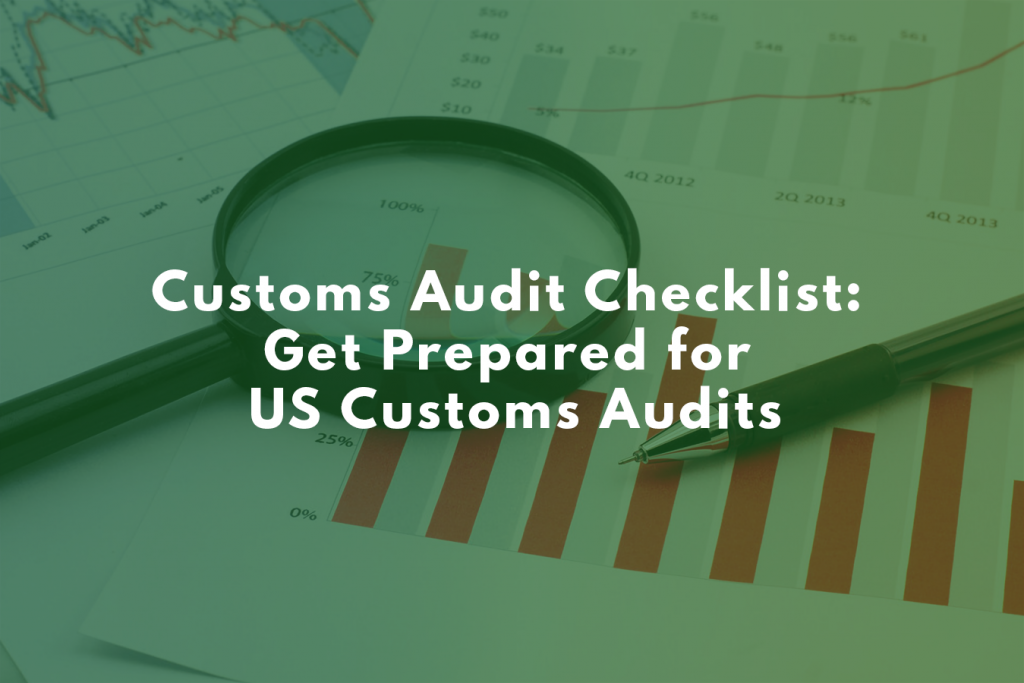If you’re a US importer, it’s a fact: at some point, Customs and Border Protection (CBP) will probably target you for an audit at some point. Large or small, your operations and transactional compliance might be under a particularly watchful eye someday. Are you prepared with your customs audit checklist?
Customs audits take a look at your operational history for compliance errors, poorly defined and documented internal control procedures, or other red flags. Even if you’re sure they won’t find any of those, an unprepared importer can suffer great penalties, up to and including the loss of import privileges.
But there’s no need to panic. With the appropriate resources, you’ll get through to the other side! Don’t forget that if you do get targeted for an audit, you can contact a customs broker like Clearit for guidance.
Why do Customs Audits Happen?
Before we talk about anything else, we need to point out that CBP audits are not accusations of wrongdoing! If you’re targeted for an audit, you haven’t been charged with non-compliance and aren’t being punished. An audit is an exploratory investigation that may lead to consequences if anything untoward is found out, but they’re often random spot checks. Customs audits happen because random spot checks help CBP collect data that can be extrapolated to all American exporters and importers, saving everyone the need for CBP to do deeper inspections for every single shipment every single time.
There are a few kinds of audits. Which one you’ve been targeted with changes based on what CBP is looking for.
First, there are the Regulatory Audit Regional Offices. Major importers, anyone involved in international trade compliance, and anyone involved in the regulations governing importing and exporting are the most likely to hear from the Regional Offices.
Different regulatory offices have their own specializations; if you hear from the Detroit office, your Importer Self Assessment may be targeted. Meanwhile, the New York office focuses on textile imports. There are 10 offices in total.
Next, there is the Focused Assessment Program. This is a risk-based approach to audits that initially only look at an importer’s risk of non-compliance. These audits only proceed to a further investigation if risk is found.
Finally, we have Quick Response Audits. These are very specific audits with very narrow focuses. If you’re targeted with a Quick Response Audit, CBP only wants to see the part of your operations connected to the audit target, and no more. The objectives of a Quick Response Audit vary.
While they’re not an audit, you may also receive an Informed Compliance letter. These reference Informed Compliance Publications. If you receive one of these, contact a customs broker like Clearit for advice on what to disclose right away.
How Do I Prepare for a CBP Audit?
If you have been targeted for an audit, the very first thing you should do is inform us — your customs broker. Customs brokers will be able to give you personalized guidance based on the specific parameters of your audit.
As you prepare, be aware that ACE filing means CBP has digital records of your import filings all in one place. It’s important to be completely honest when you disclose information, even if you have done something wrong — getting caught concealing information will make your life much harder. Disclosing a violation before even being targeted will almost always lead to a better outcome than CBP finding out on their own in a regulatory audit.
Our Suggested Customs Audit Checklist
- Contact your customs broker. Let us know you’re being audited and sign any relevant release forms so we can help you.
- Prepare the relevant information. Examine all transactions relevant to the audit focus. You’re going to want all relevant paperwork, notes, invoices, and receipts easily on hand. Be aware that your records must be retained for five years from date of transaction with customs.
- Consider voluntarily reporting any errors. Even at this point, voluntary disclosure may help your case.
- Know the answers to the following questions:
Do you have a customs strategy being overseen by a dedicated person or department?
Do you have risk management and compliance plans in place?
Do you know the total annual amount of duty and VAT paid by your business?
Do you know the annual value of your imports?
Do you know the latest regulations on tariffs and their classifications?
Do you know every step of your supply chain?
- Attend the CBP interview. Remain calm and answer their questions directly. Don’t insist that anything about your business has not changed or volunteer information unrelated to the audit focus. This may lead to your audit being expanded.
From there, CBP will inform you of the next steps. Make sure you keep your customs broker in the loop!
If you’re being audited, it’s never too late to get some help. Why not get in touch?






